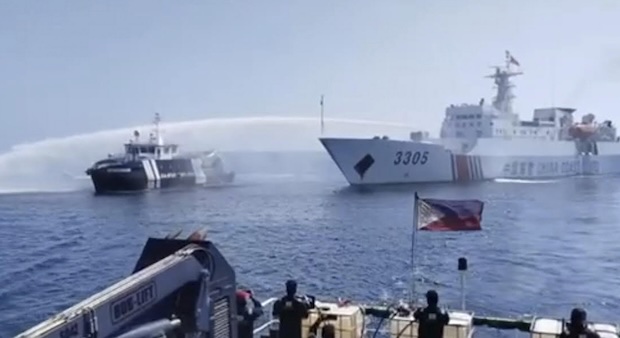DFA: PH moves in Bajo de Masinloc not provocative, don’t violate int’l. law

China Coast Guard Vessel No. 3305 fires a water cannon at BRP Datu Bankaw, a patrol vessel of the Bureau of Fisheries and Aquatic Resources, near Scarborough Shoal (Bajo de Masinloc), in this screengrab from a December 9, 2023 video by Philippine Coast Guard.
MANILA, Philippines — Philippines’ actions in Bajo de Masinloc are not aggravating the tension in West Philippine Sea and these moves do not constitute violations of international laws.
Department of Foreign Affairs (DFA) expressed this position on Monday.
In a statement, DFA said Bajo de Masinloc is an integral part of the Philippines — over which it has sovereignty and jurisdiction.
“These actions are not provocative and do not violate the Declaration on the Conduct of Parties in the South China Sea,” the department asserted.
“It is also within the Philippines’ exclusive economic zone and continental shelf,” DFA pointed out.
DFA also laid out that there are territorial transgressions being committed against the Philippines.
It did not directly name China as the aggressor.
“Activities that infringe upon the Philippines’ sovereignty and jurisdiction in Bajo de Masinloc and its surrounding territorial sea, are violations of international law, particularly the United Nations Convention on the Law of the Sea and the 2016 Arbitral Award,” it stressed.
“Bajo de Masinloc is a high tide feature and is a traditional fishing ground for Filipinos, which means that Filipino fishers have all the right to fish there,” the department explained.
“It’s 12 [nautical miles] territorial sea and the surrounding seas within the Philippine [exclusive economic zone],” the DFA noted.
“It is the duty of Philippine authorities to support and protect them in the exercise of this right,” it concluded.
The statement was issued after China’s Ministry of National Defense Spokesperson Zhang Xiaogang alleged that Philippines has “enticed countries out of the region to stir up the situation in the South China Sea.”
The Chinese official lambasted the joint military exercises and joint patrols in the West Philippine Sea.
He said by doing so, the Philippines had “seriously violated the principles of the Declaration on the Conduct of Parties in the South China Sea and jeopardized regional peace and stability, and runs counter to the efforts of countries in the region to maintain peace and stability.”
China’s sweeping claim over the West Philippine Sea, including Bajo de Masinloc, has long been dismissed by an arbitral tribunal.
In 2013, the Philippines challenged China’s assertions before the Permanent Court of Arbitration in The Hague, Netherlands.
The Court ruled overwhelmingly in favor of the Philippines in 2016.
Despite this decision, Chinese maritime assets continue to swarm and assert aggression in the territory.
China’s recent action in Bajo de Masinloc transpired early February.
According to the Bureau of Fisheries and Aquatic Resources, Chinese and Vietnamese fishermen are allegedly using cyanide to “destroy the fishing grounds in Bajo de Masinloc.”
The area is located in the disputed West Philippine Sea.
For comprehensive coverage, in-depth analysis, visit our special page for West Philippine Sea updates. Stay informed with articles, videos, and expert opinions.